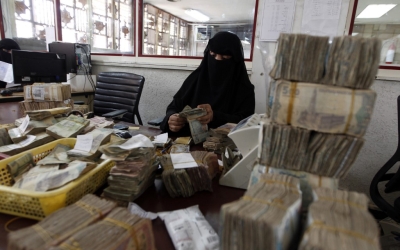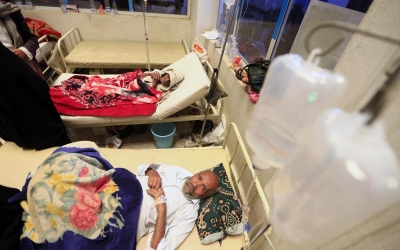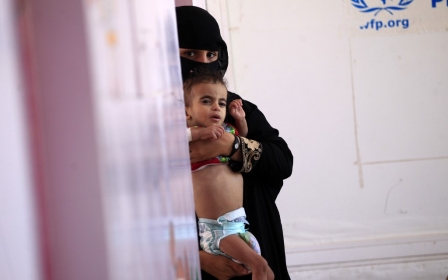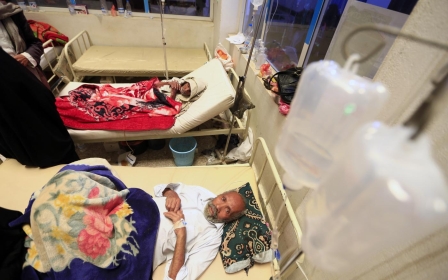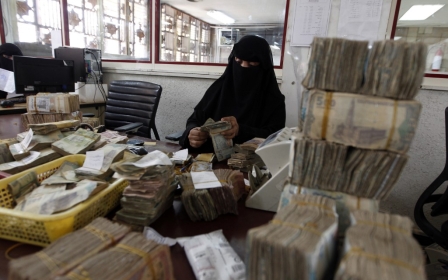'One missile targeted the mosque': More than 100 Yemeni soldiers killed in attack on camp
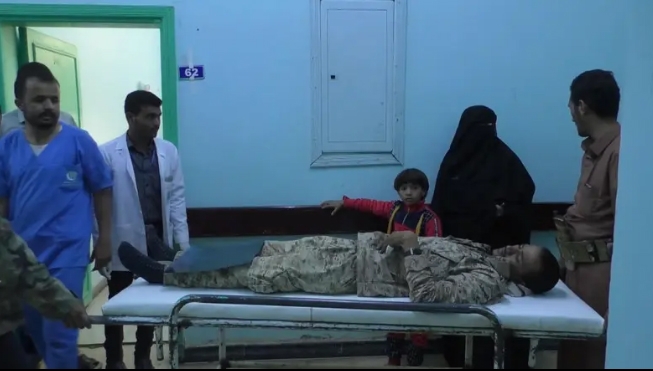
More than 100 Yemeni soldiers have been killed in missile and drone attacks blamed on Houthi rebels, on a mosque in a military camp in the central province of Marib, medical and military sources said on Sunday.
"We strongly condemn the terrorist attack on a mosque by the Houthi militias... which left more than 100 dead and dozens injured," the Yemeni foreign ministry said on Twitter.
An army spokesman said that the dead included soldiers and civilians, and that the Houthis would face a "ruthless" retaliation to the strike.
Many of the soldiers at the camp had twice been relocated, first from Aden then from Shabwa, over the past six months.
Saudi-owned Al-Hadath television broadcast a video that it said showed the gruesome aftermath of Saturday's attack.
Body parts could be seen on the floor among shredded debris. Blood is pooled on the carpet and spattered against the walls.
The attack follow months of relative calm in the war between the Houthis and Yemen's internationally recognised government which is backed by a Saudi-led military coalition.
Missiles struck the mosque at the al-Nasr camp, located about 170km east of the capital Sanaa, during evening prayers.
Medical source at a Marib city hospital, where the casualties were transported, told AFP that at least 83 soldiers were killed and 148 injured in the strike.
Death tolls in Yemen's grinding conflict are often disputed, but the huge casualty list in Marib represents one of the bloodiest single attacks since the war erupted in 2014 when the Houthis seized Sanaa.
'Cowardly and terrorist' attack
Yemeni President Abd Rabbuh Mansour Hadi condemned the "cowardly and terrorist" attack on the mosque, the official Saba news agency reported.
"The disgraceful actions of the Houthi militia without a doubt confirm its unwillingness to [achieve] peace, because it knows nothing but death and destruction and is a cheap Iranian tool in the region," it quoted Hadi as saying.
'The disgraceful actions of the Houthi militia without a doubt confirm its unwillingness to [achieve] peace, because it knows nothing but death and destruction and is a cheap Iranian tool in the region'
- President Hadi
The Houthis, who deny being puppets of Iran and say they are fighting a corrupt system, did not make any immediate claim of responsibility for Saturday's attack.
Earlier on Sunday, Qahtan, a pro-Hadi soldier in Marib, told Middle East Eye two missiles had been fired at the camp.
“One missile targeted the mosque of the camp at 6:15pm (15.15 GMT) and another fell near to the centre of the camp's leadership," he said. "At least 75 were killed and dozens injured."
The attack came a day after coalition-backed government forces launched a large-scale operation against the Houthis in the Naham region, north of Sanaa.
Fighting in Naham was ongoing on Sunday, a military source said, according to Saba news agency.
"Dozens from the (Houthi) militia were killed and injured," the source added.
The United Nations envoy for Yemen, Martin Griffiths, condemned Saturday's attack and other stepped-up air strikes, missile and ground attacks around the country.
"The hard–earned progress that Yemen has made on de-escalation is very fragile. Such actions can derail this progress", Griffiths said on Sunday, urging parties to direct their energies into politics and away from the battle front.
Soldiers already relocated twice
The pro-Hadi soldiers at al-Nasr originally fled from Aden to Shabwa in the summer and then had been relocated to Marib province at the end of last year.
Early in August 2019, battles broke out between the pro-Hadi forces, led by the fourth brigade of the presidential guards, and the Security Belt Forces (SBF) backed by the United Arab Emirates (UAE).
The SBF took over Aden and the fourth brigade, comprised mainly of soldiers from the southern provinces, withdrew to Shabwa.
Later on, battles broke out in Shabwa and Brigadier Mahran al-Qubati, the leader of the fourth brigade, decided at the end of 2019 to relocate his men to the northern province of Marib.
Qubati established al-Nasr military camp in Marib and started to receive other pro-Hadi soldiers fleeing from Aden.
The Islah party (Muslim Brotherhood) controls most of Marib so there is little opposition to Hadi and his forces in the province.
Qahtan, a pro-Hadi soldier in Marib, told Middle East Eye that Marib had become the stronghold for pro-Hadi forces as it was safe for them and they did not face any opposition.
“I was a soldier in Aden and then in Shabwa and we used to face opposition not only from the UAE-backed forces but also from residents who support the UAE," he said.
“We withdrew to Marib where people supported Hadi and his government but it seems that now there is another kind of danger in Marib,” referencing the attack on Saturday.
Qahtan, who is originally from the south, said: “Soldiers not only from the south but also returnees from the battles in the Saudi borders joined the camp during the last two months.”
The fourth brigade was supposed to return to Aden as part of last year's Riyadh power-sharing agreement between Hadi's government and the Southern Transitional Council (STC), a secessionist organisation in Yemen, but the brigade was still based in Marib.
Leadership will reconsider their presence
Mohammed Taher, a fighter in Marib who is originally from Taiz province, said Marib was not safe for the pro-Hadi forces and that there should be an agreement with the STC to allow pro-Hadi forces to return to the south.
Taher told MEE: “Large parts of Marib province are still under the control of the Houthis and al-Nasr military camp is less than 30km from the Houthis so it is not safe.
“I hope that the anti-Houthi forces find agreement to unite against the Houthis and their forces can return to their military camps.”
'The pro-Hadi forces have two enemies nowadays, the Houthis and the UAE-backed forces, and it is difficult to face them both'
- Mohammed Taher, government fighter
Taher said Marib had been the only choice for the pro-Hadi forces who had fled from the south as they did not have any other safe place to go.
“This attack [on al-Nasr] will lead the leadership to reconsider their presence in Marib and they may relocate the forces to another province,” Taher added.
“The pro-Hadi forces have two enemies nowadays, the Houthis and the UAE-backed forces, and it is difficult to face them both.”
Tens of thousands of people, mostly civilians, have been killed and millions displaced in the war that has ravaged the country, triggering what the UN describes as the world's worst humanitarian crisis.
Saudi Arabia and its allies intervened in the conflict to back the government against the Houthis in March 2015, shortly after the rebels seized control of Sanaa.
Middle East Eye delivers independent and unrivalled coverage and analysis of the Middle East, North Africa and beyond. To learn more about republishing this content and the associated fees, please fill out this form. More about MEE can be found here.


